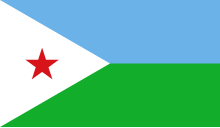Human rights in Djibouti

The issue of Human rights in Djibouti is a matter of concern for several human rights organizations. Djibouti is a small African country. It is on the Horn of Africa,[1] The US State Department Country Report on Human Rights Practices for 2019 said there were unlawful or arbitrary killings by government agents; arbitrary detention by government agents; harsh and life-threatening prison conditions; arbitrary or unlawful interference with privacy; unjustified arrests or prosecutions of journalists; criminal libel; substantial interference with the rights of peaceful assembly and freedom of association; significant acts of corruption; and violence against women and girls with inadequate government action for prosecution and accountability, including female genital mutilation/cutting. It states also that the government seldom takes steps to identify and punish officials who committed abuses, whether in the security services or elsewhere in the government.[2]
Minority and women's rights
[change | change source]Female genital mutilation is common. Equality, however, has been making strides; over 50% of judges are now women. According to American advocacy group Freedom House, minority groups such as Yemenis and Afars are not being treated fairly.[3]
References
[change | change source]- ↑ "Communication Officielle des Resultats du Recensement Général de la Population". Ministère de l'Economie, des Finances et de la Planification, Djibouti. 2010. Retrieved 18 February 2011.
- ↑ State, US Department of (2020-03-11). "Country Report on Human Rights Practices 2019 - Djibouti". Retrieved 2023-12-13.
- ↑ Freedom House (2011). "Freedom in the World 2011: Djibouti". Freedom House. Archived from the original on 2013-03-07. Retrieved 2012-08-06.
